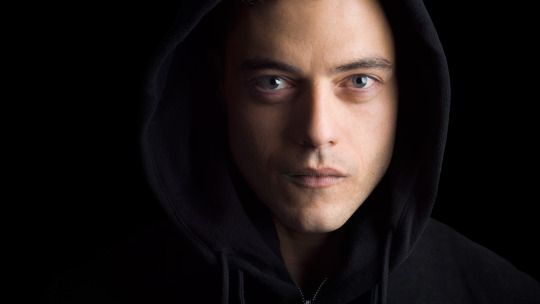
Elliott Eglash on Mr. Robot
If critics agree on anything when it comes to Mr. Robot, it’s that star Rami Malek’s eyes are so dreamy as to be almost hallucinatory. But if they agree on a second thing, it’s that the show is a tad too into its own genealogy. Its second season recently premiered on USA, rekindling an argument about whether Mr. Robot is compelling, highly relevant, and utterly original television, or merely a retread of a fairly familiar anti-corporate shtick, whose only claim to newness is its brazen appropriation of a few old favorites—A Clockwork Orange, American Psycho, Taxi Driver, and, inevitably, Fight Club. Though for a viewer like Sam Esmail, the creator of Mr. Robot, these films are less favorites than canon, or gospel. A self-professed “anti-conformist,” Esmail was put on academic probation while at NYU for a computer stunt involving an inflammatory email, and has attempted to retain his edgy side ever since—even while his show has become the cornerstone in a major and highly commercial network’s lineup. This may explain why Mr. Robot often includes blatant references to its cinematic predecessors, eschewing subtle nods in favor of vigorous seizures of the head and neck. One imagines Esmail excitedly asking, in a fairly standard freshman formulation: “What’s more original than acknowledging your own inherent unoriginality?” According to the critics: pretty much anything. David Haglund, summing up the consensus critique in an otherwise positive review for The New Yorker, writes that if you dumped Fight Club, The Matrix, and a few other dorm room favorites “into a boxy old television, shook it up, and turned it on, the result, if TVs worked like cocktail mixers, would be ‘Mr. Robot.’”
The show, set in a vaguely futuristic present, follows Elliot Alderson (Malek), a computer genius who starts out in corporate security before ditching it for the much more fun field of corporate espionage. Together with a few fellow angry young hackers (and one middle-aged one, played by Christian Slater) collectively known as fsociety, he sets out to take down the conglomerate E Corp, an unfeeling behemoth of a company headed almost exclusively, apparently, by sadists and sociopaths. When the show begins, Elliot is convinced that E Corp’s goons are following him. But then, given that he’s not taking the pills his psychiatrist prescribed for his schizophrenia (instead taking morphine he definitely didn’t get with a prescription), how much should we trust Elliot in the first place?
One could be forgiven for viewing this all as recycled matter. Deadpan voiceover delivered by an unreliable narrator? Must be...
You have reached your article limit
Sign up for a digital subscription and continue reading all new issues, plus our entire archives, for just $1.50/month.
Already a subscriber? Sign in




